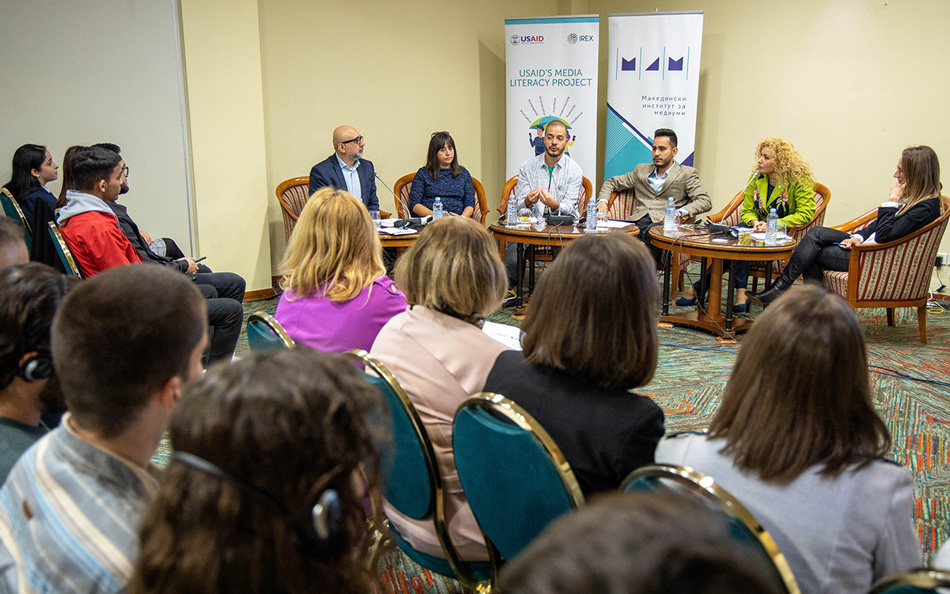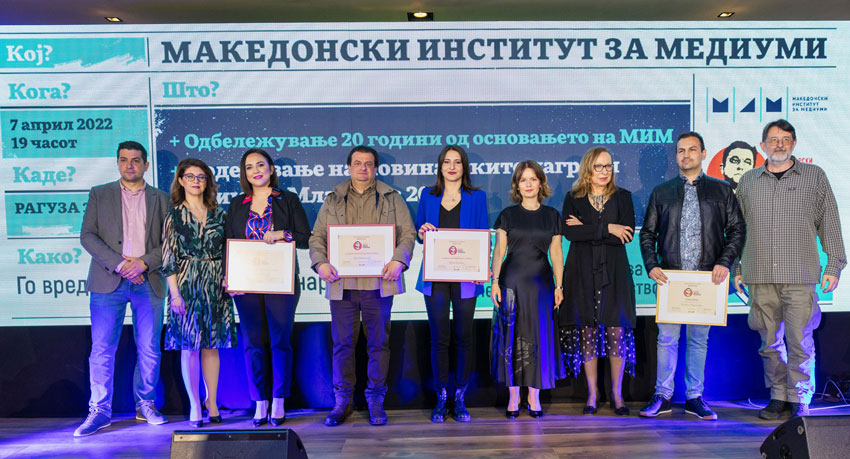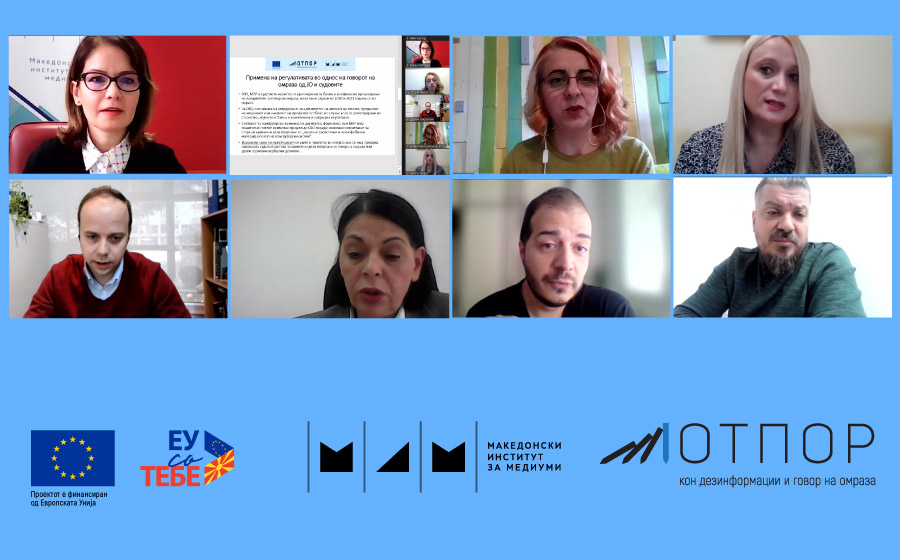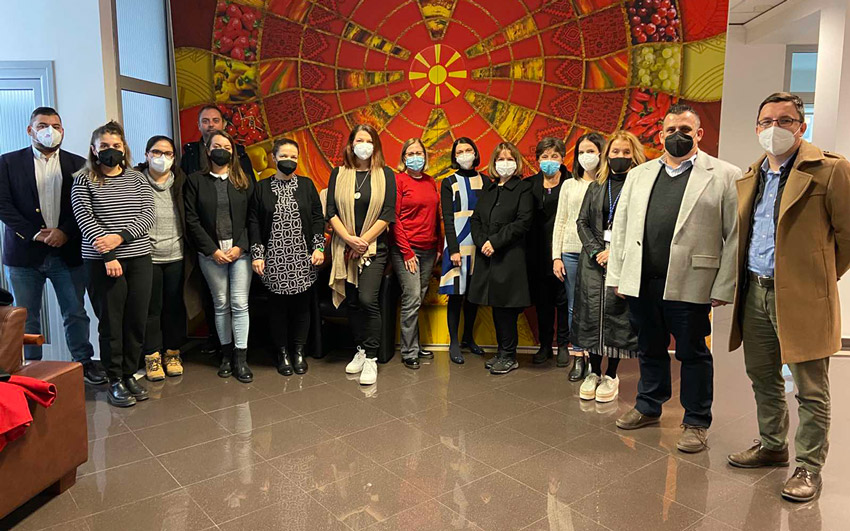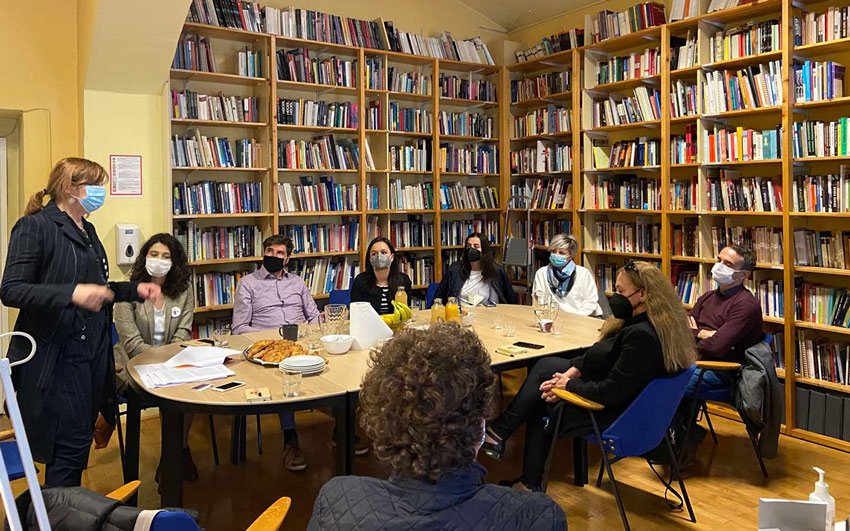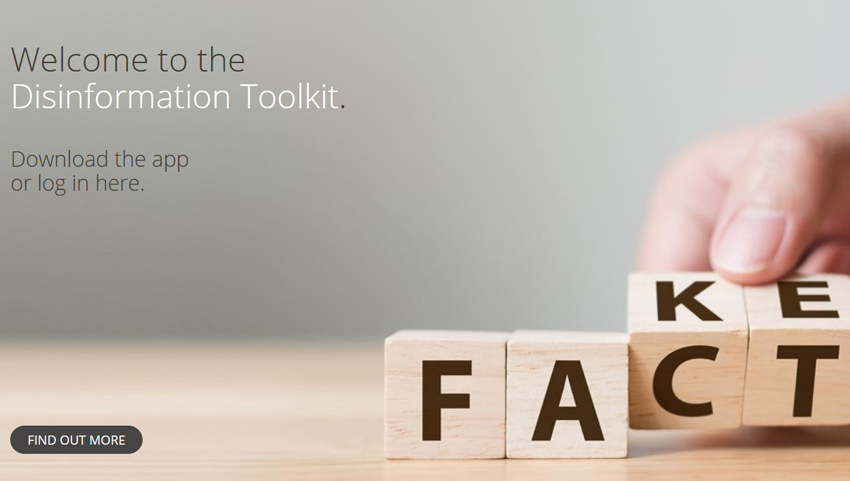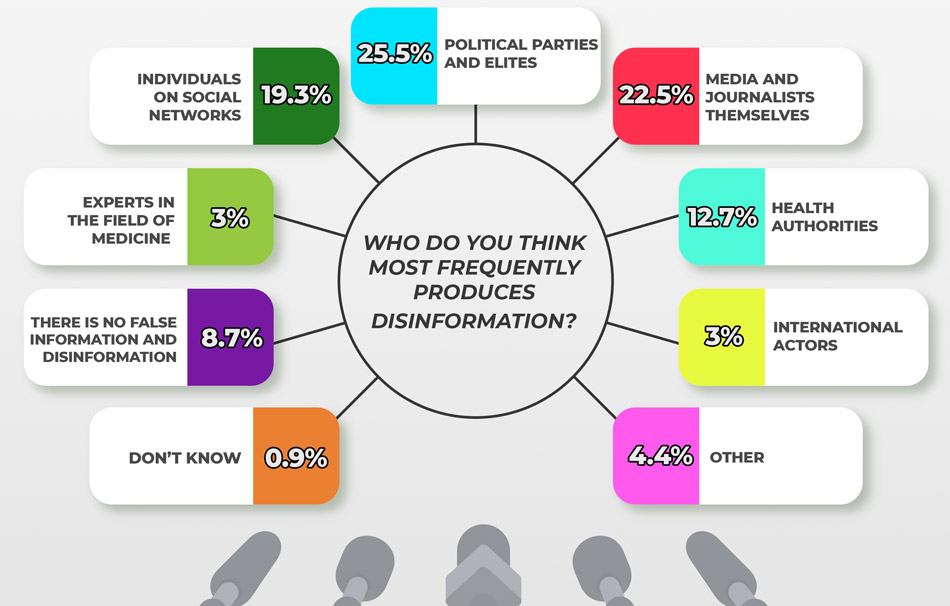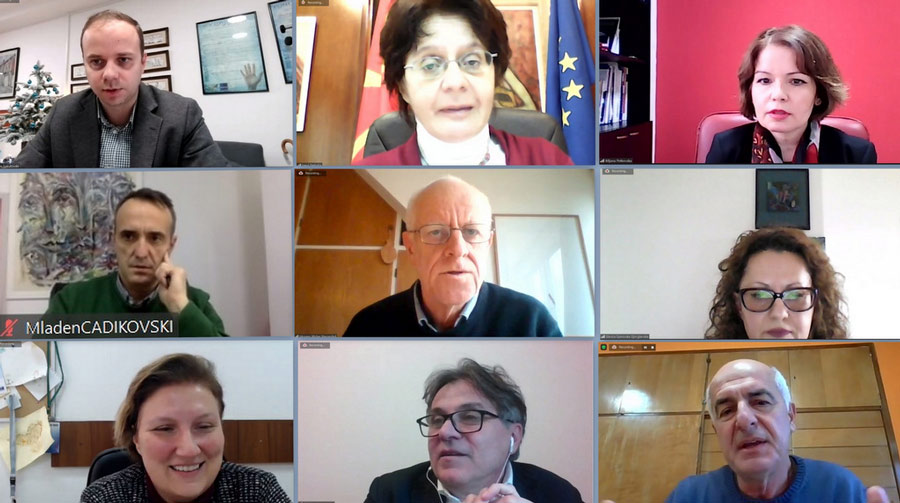How the educational system and the media can contribute to dealing with the stereotypes and prejudices - this was the main topic of the panel-discussion "Through media literacy, we educate young generations without prejudices and stereotypes", organized by the Macedonian Institute for Media and IREX.
Attending teachers, journalists and activists shared their experiences in work with students and young people who face stereotypes on different bases, both, in reality and online. The teachers, professors and civic activists talked about the mechanisms within the educational systems, while the journalists expressed the role of the media and the media literacy in tackling these phenomena.
Most of the attending students stressed the importance of media literacy for personal and professional development of young people, which is particularly significant for the new media reality that we live, as well as for building cohesion in our multiethnic society. Both, the panelists and attended guests emphasized the need of introduction of the media literacy in formal and nonformal education, as one of the ways to deal with these negative phenomena.
This event is part of the USAID's Media Literacy Project “YouThink”, and it was organized within the Media Literacy Days 2022.
News
Journalist Irena Karevska won the award for Best Investigative Story at this year’s competition for the Nikola Mladenov journalism awards for 2021, for investigating the case of procurement of software for automatic issuing of traffic fines, which was procured by the former government Secretary General Dragi Rashkovski. The story was published in the 360 Degrees programme, on Alsat – M television.
In a series of 10 news stories prepared in a modern television product, the author crafts her way in leading the reader through the investigation process in which she continuously publishes new, scandalous information, demonstrating detailed journalistic investigation, supported with facts, evidence and statements from relevant sources and interlocutors. Thus, she uses simple, intelligible and original expressions, but also demonstrates boldness, decisiveness and persistence in the intention for the case to be processed institutionally, which is an important criterion in assessing the quality of the stories.
Certificate of Appreciation for outstanding journalistic engagement in the category Best Investigative Story was awarded to the journalist Vlatko Stojanovski for the series of texts on the topic “Offshore Companies”, published on the internet platform SCOOP Macedonia.
Within the series of three investigative stories, the author demonstrated detailed journalistic investigation, crafting the processing, categorisation, and analysis of all the legal subjects which, within their ownership structure have other companies registered in the so-called offshore zones, and it also reveals information for people related to them, or are behind the companies, for their actions and activities.
Journalist Katerina Topalova was presented with the award for Most Innovative Journalistic Product for the multimedia story “From a Party Cash Cow to a Golden Chicken”, published on the internet platform Just Ask.
Through this short, dynamic and creative journalistic story, the author in an original manner succeeds to present and address to the public, the problem with the million-worth sums which the state-owned company ESM regularly spends for renting mechanisation for digging coal and tailings pond. The innovative and creative approach in this journalistic analysis and mini-research of a theme which is of high public interest lies in the fact that it is told on a Green screen by using graphics and 3D animation.
The best photo-journalism award was presented to the photo-reporter Igor Banskoliev for the photo “The Hero from Deljadrovce,” published in the Nova Makedonija daily.
The photo captures a moment of fighting with the raging fires near the Skopje village of Deljadrovce, during the fires last year.
The “hero” on this photo, with a bucket of water, half-naked makes his way through the smoke, trying to extinguish the fire on the railway near Deljadrovce. The author Banskoliev through this photo, in a most picturesque manner presents the individual fighting with the raging fires, demonstrating creativity, extraordinary aesthetic expression and sense of composition.
This year competition included:
29 stories, processed within 88 texts and video stories, in the Best Investigative Story category;
13 stories in the Most Innovative Journalistic Product category;
15 photos in the Best Reporters Photo/ Best Photo-Journalism category;
The awards for best investigative journalist stories have been awarded by the MIM traditionally since 2001. The award was named “Nikola Mladenov” in 2013, after the renowned journalist and owner of the Fokus weekly.
Photo gallery from the event is available here.
Improving court practice and strengthening media self-regulation are key factors to fighting hate speech and disinformation in the public communication. This is one of the conclusions from the panel discussion “Effectiveness of the Legal and Self-Regulatory Mechanisms in Fighting Hate Speech and Disinformation in North Macedonia”, organised by the Macedonian Institute for Media (MIM).
Speakers at the panel discussion were representatives from regulatory and self-regulatory bodies, as well as members of the media community. They spoke about the current situation with hate speech and disinformation in the public discourse, particularly considering the trends that are set by the new media and social networks.
Opening the discussion, MIM presented the analysis "Regulatory and Self-Regulatory Framework Against Hate Speech and Disinformation in the Republic of North Macedonia” which presents a factsheet on the basic legal and self-regulatory mechanisms regarding these issues.
Emilija Petreska-Kamenjarova from the Agency for Audio and Audio-Visual Media Services, in her speech pointed that the regulatory body always acts against cases of hate speech in media in accordance with the rules defined in the Guidelines for Monitoring Hate Speech which transpose the practice of the European Court of Human Rights. “When you need to establish that particular media outlet is responsible for disseminating or supporting hate speech, you should take a measure to limit the freedom of expression and that has to be exceptionally well founded and evidence based decision. The initial step is to establish whether there is hate speech, because not everything we dislike in the public discourse is hate speech” said Petreska-Kamenjarova.
Media are responsible for regular review and prompt removal of user comments published under the journalistic content on the web pages or social networks, which contain hate speech and have the potential to cause damaging consequences in the society, considers Marina Tuneva, director of the Council on Media Ethics. “In no case should media allow to be misused and serve as tools for disseminating hate, calling for individuals to unite for radical actions and acts that disturb public peace and order in the society and other actions”, stated Tuneva.
In accordance with Article 10 from the Law on Prevention and Protection against Discrimination, the Commission treats hate speech as harassment, which has the aim to damage the dignity and integrity of the person, stated Vesna Bendevska, member and until recently president of the Commission. “The Commission so far has investigated 30 cases which pertain to harassing speech, that has always been based on some of the discriminatory grounds laid down in the Law” said Bendevska. She added that increased number of cases of hate speech have been noted during certain societal events, such as the Pride Parade, or during electoral campaigns, when hate speech targets the political beliefs.
Dragan Sekulovski, Executive Director of the Association of Journalists of Macedonia (AJM) underlined that although the country was lagging behind in court practice regarding hate speech, however, the recent first verdict for hate speech on Facebook, reached in favour of the AJM, is sign of hope that steadily there will be court practice for such deeds. “Last year the AJM in talks with the responsible judicial bodies, as well as with the Ministry of Justice, requested the establishment of separate unit within the Basic Public Prosecutor’s Office, composed of prosecutors that would be trained and possess the necessary expertise for deeds related to hate speech, as it is a matter of quite specific cases, particularly when it comes to verbal acts committed online” added Sekulovski.
This panel discussion was organized within Resilience: Civil Society for Media Free of Hate and Disinformation, a regional project financially supported by the European Union and implemented in the Western Balkans and Turkey by a consortium of media development organizations led by SEENPM. It is part of a series of publications on the same general topic researched in Albania, Bosnia and Herzegovina, Kosovo, Montenegro, North Macedonia, Serbia and Turkey (all publications are available on the SEENPM website).
Empowering youth with critical thinking skills for resisting disinformation and building active and responsible citizenship
The U.S. Agency for International Development (USAID), in partnership with IREX, the Macedonian Institute for Media (MIM), the Ministry of Education and Science and the Bureau for Development of Education launched the new Media Literacy Project YouThink. This five-year project brings Macedonian and international partners together to work with young people to develop the critical thinking and information engagement skills they need in order to build resilience to disinformation, thus contributing to building active, responsible, and empathy-driven citizenship.
IREX will implement the project in collaboration with the Institute of Communication Studies, the Youth Educational Forum, and a first-of-its-kind youth steering committee, Learn to Discern (Учат да распознаваат), which was established to ensure that the young people in the country play an important and active role in activity design, leadership, and decision-making on national and local level.
Ambassador Kate Byrnes emphasized that "no matter what the source, information is only powerful if people know how to use it. Those who use information responsibly will strengthen social cohesion, demand good governance, and take initiative to improve the lives and prospects of their families and communities."
The Minister of education and science, Mila Carovska in her address stressed that the new educational programs that are being implemented from 2021, should contribute to shaping generations who have more knowledge and skills for combating with fake news. “The citizens who have critical thinking skills actively participate in the public debate and they influence the changes. They challenge the institutions to be more transparent and accountable, which is really necessary for progress of the society that cares for everyone and for the economic growth and development of the state.”
Mihajlo Lahtov, the Project Director, emphasized that it is essential to work with young people from a very early stage and help them develop skills and habits they need to build resilience against disinformation. “USAID's Media Literacy Project YouThink will mobilize strategic partnerships across society to push for inclusion of media literacy concepts and critical information engagement skills in standard coursework through schools and universities at all grade levels, but also through non-formal activities at youth-led and youth-serving clubs and organizations,” Lahtov said.
Expressing his support for initiatives to improve the quality of education, Zekirija Hasipi, the Director of the Bureau for Development of Education, informed that media literacy is part of the new educational programs in purpose of “equipping students with skills for critical thinking, analyzing different forms of expression and incorporating media literacy.”
MIM Director Biljana Petkovska highlighted that “it is of key importance for primary and secondary teachers to acquire knowledge, skills, and educational resources through the project that will enable systemic integration of media literacy in the educational process.”
At the launch’s youth debate, five panelists from diverse backgrounds discussed the importance of media literacy in the information landscape today and of integrating such skills and resources into classrooms, so the young people could become more active actors in the society.
The panelists addressed various ways disinformation affects their lives and their communities, as well as possible mechanisms for combating this phenomenon. All participants emphasized that media literacy and critical thinking skills are indispensable for navigating the 21st Century information environment in a safe and responsible manner.
In addition, IREX, MIM, the Ministry of Education and Science, and the Bureau for Development of Education under the umbrella of the Ministry signed a Memorandum of Understanding that reflects their cooperation and charts a clear way forward for the systemic introduction of media literacy and critical information engagement skills and concepts into primary and secondary school curricula throughout North Macedonia.
NOTE TO EDITORS:
The American people, through USAID, have invested more than $833 million in North Macedonia since 1993. USAID is the world’s premier international development agency and a catalytic actor driving development results. USAID’s work advances economic prosperity, demonstrates American generosity, and promotes a path to recipient self-reliance and resilience. Follow USAID in North Macedonia on Twitter, Facebook, YouTube and Web site.
The photo gallery of the event is available here.
Macedonian Institute for Media (MIM), supported by the EU Delegation organised a study visit to Brussels in the period of 8-11 November, for journalists and civic activists from the field of media.
The visit was organised with the goal to assist in strengthening relationships and building synergy among media, civil society and institutions in fighting disinformation, as well as to promote media literacy in our country.
Participants had the opportunity to discuss with relevant representatives of European institutions, such as the Western Balkans Task Force on Strategic Communications within the European External Action Service (EEAS) as well as media organisations and associations headquartered in Brussels.
Discussions in the meetings focused on the need for institutional response to disinformation and the importance of building partnerships among relevant stakeholders, as well as activities undertaken by the European institutions in this sphere, including EU relations with private companies and platforms such as Facebook, Google, YouTube and others.
Among other things, it was pointed that there was need of increased transparency and publishing the criteria that these social networks use in removing content published by users.
During the meetings with the representatives of the European Federation of Journalists, UNESCO and the European Association for Viewers Interests (EAVI) the conversation focused on the latest activities that these organisations have undertaken in strengthening co-operation between media and civil society and the necessity of improved professionalism in media reporting and effective resilience to disinformation. The interlocutors underlined the need for designing new, creative approaches for advancing citizen knowledge and skills, to be able to recognise and deter manipulative content, since methodologies and technological innovations for creating and disseminating disinformation are continuously perfected.
Within the study visit to Brussels, the group met ambassador Agneza Rusi-Popovska and members of the Mission of the Republic of North Macedonia to the EU. During the meeting they discussed relevant themes in relation to our country’s European integration process and informing citizens about these issues.
The Macedonian Institute for Media, with support of the Delegation of the European Union in Skopje organised a study visit to the Republic of Slovenia in the period of 4-8 October, for journalists and representatives from civil society organisations that work in the media sphere in the country.
The goal of the visit was to exchange experiences with Slovenian colleagues about themes and issues in regard to modern challenges for media and the public communication space, with focus on disinformation, fact-checking, false narratives and influence of social networks in redefining journalism, as well as misuse of the public communication space in spreading hate speech.
During the visit, Macedonian representatives met renown investigative journalists from the online media Podčrto and Oštro, civic activists and media experts from non-governmental organisations Umanotera and the Ljubljana Peace Institute, representatives from the Association of Journalists of Slovenia, as well as editors in chief of news services in the public broadcaster Radio Television Slovenia.
The visit was also an opportunity to attend the EU Summit which took place on 6 October in Brdo, wherefrom journalists reported for their media outlets.
Slovenian media space faces numerous challenges in regard to the current political developments in the country, which are also due to the influence of new communication technologies, particularly the social networks, on everyday life of citizens.
Without exception, the necessity of protection, support and affirmation of professional journalism as a public good was underlined in all meetings, which is of essential importance for advancing democratic processes. It was concluded that media freedoms largely depend on the democratic capacity of the authorities, who often use various mechanisms which may jeopardise or contest those freedoms. Financial dependence of media from authorities’ decisions may become a serious obstacle for regular functioning, mostly for the public broadcasters and news agencies owned by the state. Therefore, it is necessary for the public broadcasters to be financed largely by the funds collected through the broadcasting fee, not from the state budget, as it was underlined by the participants in the meetings. Regarding false narratives, it was highlighted that the battle against them could be won only by quality journalism that serves the citizens, by inciting media literate public and by encouraging overall societal support for the existence and development of free media.
Albany Associates has created an app that provides a step-by-step toolkit for identifying dis, mis, and mal-information in the Western Balkans using online tools. It is particularly useful for journalists running across suspicious content in their daily work. It was developed in close collaboration with a regional network of independent media development partners and with the support of the United Kingdom's Foreign Commonwealth & Development Office.
The regional network was led by Mediacentar Sarajevo and includes the Albanian Media Institute, KosovaLive, the Macedonian Institute for Media, the Montenegro Media Institute, and Novi Sad School of Journalism in Serbia. Internet connection is initially needed to download the app onto a mobile device or computer, and then the app can be accessed at any time offline. The app is available in Albanian, Bosnian, Montenegrin, North Macedonian and Serbian, and these versions can be found by following the steps below:
Download the app “Disinformation Toolkit” from the App Store or Google Play, or go to nimbl.uk
Click ‘Register' and enter your details: e-mail address and own choice of password
Download the toolkit in your language
Macedonian Institute for Media in cooperation with M-Prospect agency conducted a survey of citizens’ views regarding media reporting during the COVID-19 pandemic. The telephone survey was conducted 14-20 December 2020, at a random sample of 1003 respondents.
The respondents were asked how much they agreed with the statement that media have been reporting professionally and impartially during the COVID-19 pandemic. According to their responses, every fourth respondent (25%) completely agrees with this statement, 39 % somewhat agree, 21.8% somewhat disagree, whereas 13.6% completely disagree. Considered cumulatively, the percentage of those who consider that the reporting has been professional and impartial is 64.1% and is larger than the percentage of those who disagree, which stands at 35.4%.
Analysis of the responses shows that the agreement with the statement for professional and impartial reporting increases with age. Thus, 19% of the 18-29 age group completely agree with the statement that media have been reporting professionally and impartially during the COVID-19 pandemic, the percentage with the 30-64 age group is 22%-23%, whereas with the age group above 65, the percentage is higher and stands at 36%. Nearly every third ethnic Macedonian, or 29.4%, completely agrees with this statement, in comparison to 13.3% of the surveyed ethnic Albanians.
Media in which citizens have most frequently spotted disinformation and false information are mainly the social media (28.8%) and the television channels (26.8%). Nearly 19 % of the respondents said that they had spotted disinformation and misinformation on the internet portals, 8.7% in print media, around 4% on radio. 12% hadn’t spotted disinformation and misinformation. It is notable that the younger generations, from 18 to 39 years of age highlight social media and internet portals as types of media where they spotted disinformation and misinformation in comparison to the older, especially those above 50, who highlight television as a source of disinformation and misinformation.
From those that had pointed social media as source of disinformation and misinformation, the largest percentage (84.5%) pointed Facebook, 7.6% YouTube and 5.8% the social network Twitter.
False, unchecked information and disinformation is what the majority of respondents (39.7%) object to in the way how journalists report. 15.3% of the respondents said media bias towards certain political centres of power bothered them, 13.5% have a problem with discrimination of certain groups in society and hate speech, 12% pointed that sensationalism in reporting bothered them, 8.3% said it was disrespect of privacy and 9.6% said had no complaints for journalistic reporting.
Looked through the prism of ethnicity, the results differ with ethnic Macedonians and Albanians – sensationalism, discrimination of certain societal groups and disrespect of privacy in reporting was more frequently mentioned by the ethnic Albanians, whereas the ethnic Macedonians objected more to the reporting of false, unchecked information and disinformation, as well as the bias towards the political centres of power.
Regarding themes for which the respondents spotted false information and disinformation, largest percentage (22.7%) point to themes about number of people infected with coronavirus, then vaccine safety (13.7%), treatment of the virus infection (12.1%), origin of the virus (11.3%), availability of tests (11.2%), religious festivities of Ramadan Bayram and Easter (8.8%), as well as the parliamentary elections and the pandemic (4.7%), the beginning of the school year during the crisis (2.7%). The percentage of those that hadn’t spotted disinformation and false information is 8.4%.
Regarding the issue of who produces disinformation and misinformation, every fourth respondent said the political parties and elites did (25.5%), more than a fifth (22.5%) said the journalists and media themselves, 19.3% said individuals on social networks, 12.7% said the health authorities. Experts from the field of medicine and international actors were pointed by 3% of the respondents.
Ethnic Albanians to a greater degree more than ethnic Macedonians consider that health authorities themselves cause disinformation (26.2% in comparison to 8%).
Two thirds of the respondents (69.6%) said they were satisfied by the quality of information from the institutions during the pandemic, with 22% saying they were completely satisfied, whereas 47.6% said were somewhat satisfied. Thus, the percentage of respondents who are satisfied by the quality of information communicated by the institutions during the pandemic is larger with the ethnic Macedonians.
When asked which sources of information respondents trust most during the COVID-19 pandemic, domestic TV channels (50.5%) are the most frequent choice and nearly one quarter (23.8%) trust most foreign TV channels. The percentage of those who trust the information received from social media friendships is 7.8%. Information published by the internet portals was trusted by 5% of the respondents and 4.1% trusted printed media. However, this data should be considered into the context of general decrease in newspapers readership and growing migration, especially of the younger audiences, online. Trust in domestic TV channels grows with age, especially with those above 50, whereas trust in internet portals and information received via social media friendships is highest with the 18-49 age group and afterwards decreases.
Those who responded to whom they trust most as a source of information, were asked also why they trusted the said sources. Accurate and timely reporting was the reason for 41.3% of the respondents, impartial reporting for 30.5%, diverse and comprehensive reporting for 20.2%, and for 5.8% reporting without sensationalism was the reason for trust.
Respondents also answered the question whether they consider if certain marginalised societal groups were sufficiently represented in media reporting during the COVID-19 pandemic. Every third respondent (37.6%) considers that women were insufficiently represented in reporting, in comparison to nearly 60% who considered that they were sufficiently represented. Every other respondent (48.7%) considers that children were insufficiently represented. There is division of views when it comes to media representation of Roma (45.2% who consider that they were sufficiently represented, in comparison to 50.5% who consider they were not). Every other respondent considers that the LGBTI community was insufficiently mentioned. There is similar distribution of responses for disabled persons – 45.2% consider they were represented, in comparison to 50.3% that they were not.
DEMOGRAPHICS
20.2% of the respondents are aged 18-29, 18.7% are in the 30-39 age group, 18% are aged 40-49, 21.4% belong to the 50-64 age group and 21.5% of the respondents are above 65 years of age.
72% of the respondents are Macedonians, 23.2% are Albanians, 4.8% have declared other ethnicity.
3.2% of the respondents haven’t completed elementary school, 15.2% have completed elementary school, more than half of the respondents (55.5%) have completed high school, 5.6% have completed college, 18.9% have completed undergraduate university education 1.6% have completed postgraduate education.
16.5% of the respondents are employed in the public administration, one quarter of the respondents (24.7%) are employed in the private sector, 1.2% in non-governmental organisations, 5.0% are self-employed, 3.3% are farmers, 16.8% of the respondents are unemployed, 7.8% are students, 4.2% are occupied in domestic work and 20.5% of the respondents are pensioners.
Nearly two fifths of the respondents (39.1%) live in the country, 60.9% live in a town.
The survey was conducted within the project News and Digital Literacy Project – Where Fake News Fails, implemented by the Macedonian Institute for Media, the Institute for Communication Studies, the Independent Trade Union of Journalists and Media Workers, and the Media Diversity Institute from London, funded by the European Union.
The findings in this survey are the sole responsibility of the surveying agency and the purchaser of the service and should not be considered to reflect the views of the European Union.
Protecting the copyright in the media sphere is one of the key challenges faced by journalists, photojournalists and media workers in the country, especially after the advent of modern digital newsrooms. The legal possibilities for dealing with plagiarism and the role of the relevant institutions was the main topic of the two-day workshop organized by the Macedonian Institute for Media and the Association of Journalists of Macedonia, in order to encourage a debate among the stakeholders and exchange positive experiences on issues related to copyright protection.
During the first day of the workshop, 40 journalists, photo-reporters, media workers, lawyers and representatives of the Ministry of Culture discussed the Law on Copyright and Other Related Rights and its implementation in order to protect the rights of media workers.
In her address, the Minister of Culture Irena Stefoska, said that the Ministry is working on amendments to the Law on Copyright and Related Rights in accordance with the European standards and that soon the draft text of the Law with the included amendments will be sent for insight and opinion to all interested parties before it enters the government procedure.
The President of the European Federation of Journalists, Mogens Blicher Bjeregrerd, informed about the efforts of the Federation for improvement of the European framework related to copyright and rights of journalists. He pointed out that copyright protection is an important precondition for improving the economic situation of the media workers and that they are entitled to compensation when their copyright works are published in the media.
The participants also considered the legal specifics of the Law on Copyright in the context of the work of the media, especially from the perspective of the professional online media that suffer the most from the copy-paste journalism. Goran Mihajlovski and Aleksandar Damovski, both editors running the online media Sdk.mk and MKD.mk, respectively, cited the issue of unauthorized downloading of content from their media, noting that there were examples of court cases when some of the courts did not recognize their Internet portals as media.
Neda Zdraveva, professor at the Faculty of Law "Iustinianus Primus" pointed out that not all media products are copyright works. "Media products that are usually transmission of official texts of a political, legislative and judicial nature, as well as other daily news that have the character of ordinary - media information, simple facts and data cannot be considered copyright", said Zdraveva. According to her, in order for the media information to be considered a copyright work, it is necessary for the author or the journalist to have his own intellectual contribution in their creation.
The concept of collective copyright management and the legal practice in copyright protection of journalists and media workers were the focal topics for the second day of the workshops. The participants raised the question of unauthorized downloading of copyrighted photographs and how can the self-regulation and mediation help overcome the problem of unauthorized downloading of audiovisual content.
Arbnora Mehmeti, a photo reporter in the Meta.mk news agency, pointed out the problem of media copying photos, and the same goes for the political parties, emphasizing that all photos, even on the Internet, were created by someone, and care must be taken on respecting the copyrights.
Lawyer Natalija Milenkova pointed out that the practice has shown that it is much easier to prove authorship in photographs, while in journalistic texts it is more complicated to prove the violation of copyright, especially when there is a drastic change of the original text.
The general conclusions from the two-day event were the need for amendments of the Law on Copyrights in order to further recognize the copyright of the journalistic works, which would be considered as an important aspect in future court proceedings in which journalists would claim their rights. According to the current practice, the costs of court proceedings before the civil courts are expensive and that is one of the reasons why journalists and photojournalists rarely dare to sue, which results in a very modest court practice. High administrative costs in litigation can also lead to closure of some online media outlets that have been found to have published photos without prior consent of the authors. Additional training of judges is needed on these topics in the Macedonian judiciary, whether it is a civil or criminal court, given that there is very little practice when it comes to these acts. This is especially important in the long run, because the media workers have greater confidence in the justice system only if there fair judgments that are in line with the ECtHR practice.
The event was organized as part of the "Promoting Media and Information Literacy and Strengthening Independent Media in the Western Balkans" project implemented by the Albany Associates from London in partnership with regional media development organizations, including the Macedonian Institute for Media. The project is funded by the British Government.

